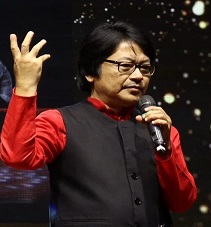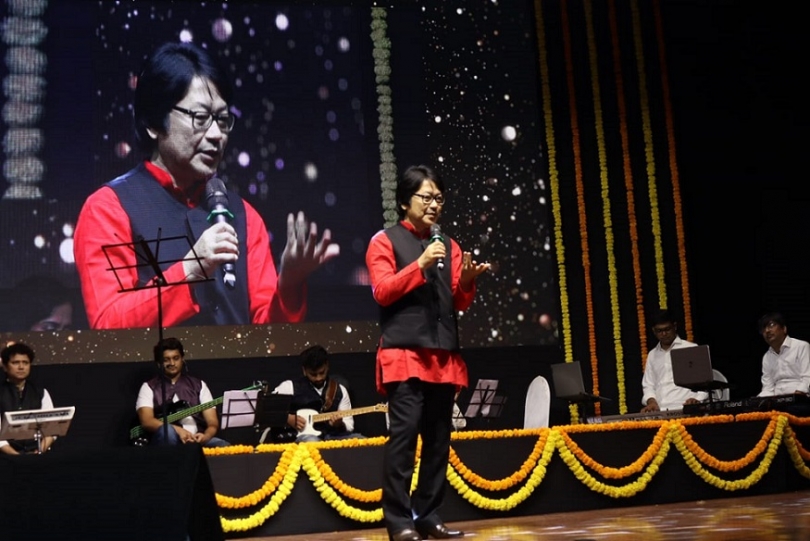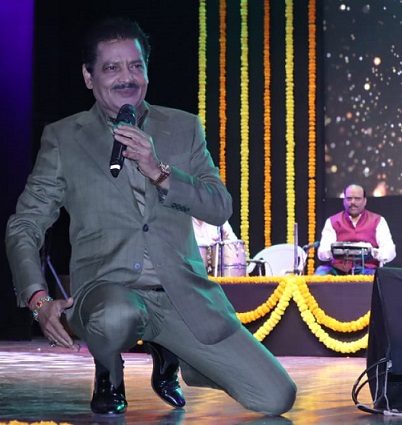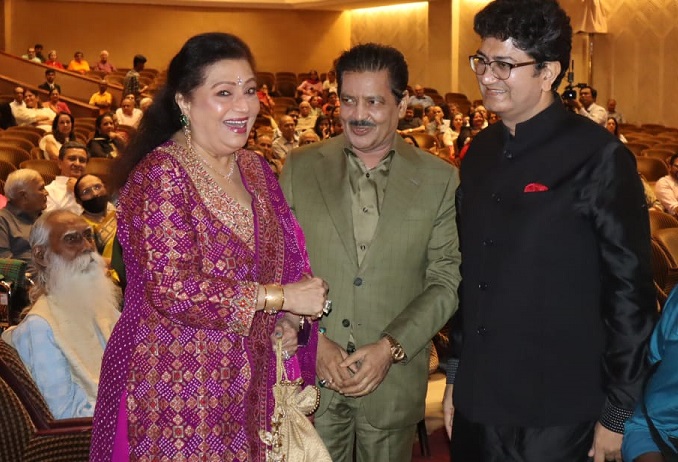
Guru Indrajeet Keisham’s mission: Learn music, perform music save music
Hindustani music, like other forms of traditional Indian music and dance, could face extinction over the coming decades. Already, many Hindustani musical instruments find no players, proving the late maestro’, music director Naushad’s prediction true. Obviously, this is happening because of the times we live in, the electronic era, where music can be ‘sampled’ and then played according to the requirements, with the help of a computer. Each instrument can be replicated. Side by side, the role of music in Hindustani films is diminishing, with many films having just a couple of songs, and some not including them at all. That is where Guru Indrajeet Keisham’s IKSA comes in.
Yesterday, on the back of six such evenings, eleven students, a full team, of IKSA performed film songs at the Nehru Centre auditorium, Worli, Mumbai, under the tutelage of Guru Indrajeet Keisham Singh, accompanied by nine proficient musicians, from films released during 1951 to 1995. There were 44 songs listed, which would take over four hours to render, but the organisers cleverly picked only parts (mukhdas, antras), to keep within a time limit. The programme still lasted over four hours, but that was because the VIP guests were asked to come on stage, once the IKSA members’ singing was over, and they spoke as well as performed.
All eleven IKSA singers were students of Guru Indrajeet, and were at various levels of learning. A couple of them had reached the visharad (a diploma/degree) stage, and, quite naturally, they drew the maximum applause. A curious element of the choice of songs was the sparsity of songs by Mukesh, Mohammed Rafi and Manna Dey. But they did set off the proceedings with a Mukesh-Shankar-Jaikishan number, ‘Jaaney kahaan gaye voh din’ from Mera Naam Joker, and, towards the end, there was a duet from Milan, ‘Saavan ka maheena’ (Mukesh-Lata-Laxmikant Pyarelal). A Rafi song came late in the day, one that he had sung for Rajesh Khanna, in The Train, ‘Gulaabee aanken’ (Rahul Dev Burman). And to end the session, they picked that masterpiece from Hanste Zakhm, ‘Tum jo mil gaye ho’, by Mohammed Rafi, under the baton of Madan Mohan. In all, they showcased the talent of 10 singers, 16 music directors and 20 lyricists who adorned the Hindustani film industry, over the decades.
As they came along and were introduced, we found that most of the singers are from the upper echelons of society, and the women have been able to pursue their hobby with the support of in-laws and their children. None of them would be interested in making singing a full-time profession or making it a profitable venture. It is a hobby and a passion, pure and simple. IKSA is derived from the initials of Indrajeet Keisham Singh but stands for ‘all are equal’. In Urdu, ik sa would mean ‘similar’, close to saying all are equal.

A product of the Bharatiya Vidya Bhavan music school, Indrajeet Keisham Singh found himself stranded on an ‘island’ nearly forty years ago. There was no teacher to teach him. He waited patiently for a whole year, before the school could get Guru Sudhindra Bhaumik to migrate to Mumbai. Bhaumik was present on the occasion to give blessings to his pupil, Indrajeet Keisham Singh, who had now become a revered teacher in his own right, though his looks belie his age. Around the same time, a young lad from the Bihar-Nepal border came to Mumbai to learn music at Bharatiya Vidya Bhavan, nursing ambitions of becoming a playback singer. His name was Udit Narayan. That is where I first met him. We later met a few times in the HMV recording studios when he was recording a bhajan album. Udit was delighted that he had sung a duet with Mohammed Rafi, his idol. Of course, the Udit Narayan show that I compered in the Donald Trump Casino, Atlantic City, New Jersey, in 1995, remains my fondest memory.
Around seven years ago, Indrajeet Keisham realised that merely teaching is not enough. Something needs to be done to protect and preserve Hindustani music. He chose the simplest form – Hindustani film music – to attract interest and crowds. “Just as Jagjit Singh brought the ghazal to the common man, who did not have to search for meanings of its chaste Urdu words, film music has been doing great service to the cause of Hindustani music.” He beseeched the audience to take the leaflet about IKSA that was distributed on the occasion, read it, and pass it on. As a sample of his training and prowess, he sang just one song that sounded flawless to my untrained ears. Even his pronunciation of Urdu words was correct, a rarity. And he has now taken another laudable step: IKSA Relief Fund. Through this initiative, IKSA will provide financial assistance to senior Hindustani film artistes, who have fallen on bad times.

Reminiscing about his own bad times, guest Udit Narayan recalled how Indrajeet would help him when he was dead broke. Udit also obliged the audience by singing several songs. Among the other VIPs present was lyricist Prasoon Joshi. Joshi gave his blessings and narrated a poem, which was like a film song. Udit lamented that one song of Prasoon that he had sung had been re-recorded with another singer. Actress Bindu stressed the value of music and mentioned that some doctors actually have music on while performing operations. She had seen this for herself when she had been operated upon. Also present were music director Daboo Malik and Subhashchandra (Chairman of the ZEE Group).

Guru Sudhindra Bhaumik (seated), Bindu, Udit Narayan and Prasoon Joshi
A special word for the compère, Payal Shah. She belongs to the rare breed who, even if they have made notes and memorised them, sound spontaneous and extempore. And several special words for the musicians. There were nine of them. Sometimes they did not stick to the original and played the opening or interlude music as variations on a theme. Yet, this did not detract from the song, and, in fact, added to the impact. Occasionally, when some singer went too fast or too slow, they were able to match the tempo in a flash. Obviously, they must have been hand-picked by Guru Indrajeet Keisham. The acoustics gave no cause for complain.
IKSA and Guru Indrajeet Keisham have crossed seven milestones of performances. That is symbolic, in itself, because music has seven surs. He and his team are full of ambition, and we will watch their progress.














